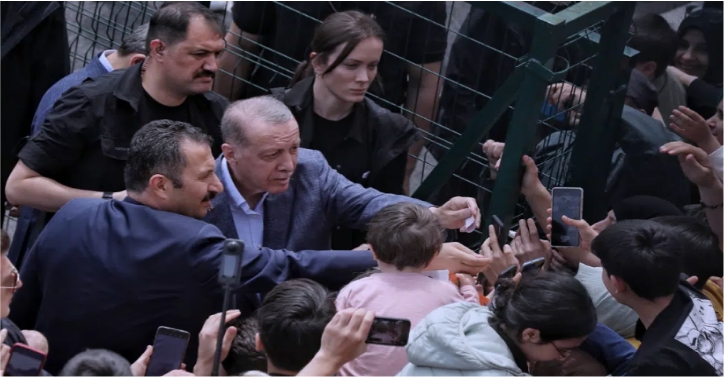
Turkish President Recep Tayyip Erdogan finds himself in a closely contested election against his primary rival, Kemal Kilicdaroglu. The outcome, expected to be announced in the coming days or after a runoff in two weeks, holds the key to Erdogan’s continued control or a potential shift towards a more democratic trajectory for Turkey. Addressing his supporters, Erdogan expressed confidence in his chances of victory and pledged to honor the nation’s decision if a runoff becomes necessary. The election campaign has revolved around crucial domestic issues such as the economy, civil rights, the aftermath of a destructive earthquake, and Erdogan’s economic leadership and international involvement.
As the unofficial vote count nears completion, Erdogan’s voter support has dipped below the required majority needed for an outright win. At present, he holds 49.4% of the votes, while Kilicdaroglu stands at 44.9%. Kilicdaroglu, backed by a six-party alliance, exudes optimism about prevailing in the second round and steering the nation towards democracy. The official results, inclusive of overseas votes yet to be tallied, will be announced after the completion of the count.
Since assuming power in 2003, Erdogan has campaigned on promises to reverse democratic regression and tackle economic challenges. In contrast, Kilicdaroglu has vowed to restore democracy, safeguard civil rights, and revive the struggling economy. The election also encompassed the selection of lawmakers for Turkey’s parliament, which had significantly curtailed authority following a constitutional referendum in 2017.
The international community has closely monitored these elections, viewing them as a litmus test for the opposition’s capacity to challenge Erdogan’s rule. Erdogan has consolidated power in his hands and actively sought to amplify Turkey’s influence globally. However, critics argue that his authoritative approach has contributed to a high cost of living and economic instability. Erdogan’s government has additionally faced censure for its response to a recent earthquake and its treatment of civil liberties.
The election results carry significant ramifications for Turkey’s future, determining whether Erdogan continues to exert control or if the country embarks on a more democratic path under Kilicdaroglu’s leadership.
In his address to supporters, Erdogan expressed optimism about his chances of winning the election but also pledged to respect the nation’s decision if a runoff vote is required. The campaign has been dominated by issues of domestic importance, including the struggling economy, civil rights, and the aftermath of a devastating earthquake. Additionally, the international community has keenly observed the election due to Erdogan’s unorthodox economic policies and his attempts to assert Turkey’s influence on the global stage.
As the unofficial vote count nears completion, Erdogan’s voter support has fallen below the majority needed for an outright victory. Currently, he holds 49.4% of the votes, while Kilicdaroglu, backed by a six-party alliance, stands at 44.9%. Kilicdaroglu expressed confidence in winning the second round and bringing democracy to the country. The final results, including the overseas votes that are yet to be tallied, will be announced once the count is finalized.
Erdogan, who has been in power since 2003, campaigned on promises to address democratic backsliding and the economic challenges facing the country. Kilicdaroglu, on the other hand, pledged to restore democracy, protect civil rights, and revitalize the struggling economy. The election also included the selection of lawmakers for Turkey’s parliament, which had significantly diminished power following a constitutional referendum in 2017.
Critics have accused Erdogan’s authoritarian style of exacerbating a cost-of-living crisis and causing economic instability. His government has also faced criticism for its response to a recent earthquake and its handling of civil liberties. The election results hold immense significance for Turkey’s trajectory, as they will determine whether Erdogan maintains control or if the nation takes a new path towards greater democracy under Kilicdaroglu’s leadership.
As the final votes are counted and the results are awaited, all eyes remain on Turkey, eager to witness the outcome that will shape the country’s political landscape and future direction.
